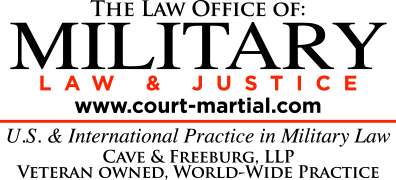Unreasonable Charging Decisions
Prosecutors love to overcharge--they come from the perspective that the more charges the worse you look. In the process prosecutors can violate the legal norm against unreasonable multiplication of charges (URMC).
As the Army appeals court recently notes and has found, an accused can forfeit and waive a challenge to the practice of URMC if not raised and argued at trial. URMC motions are fairly straightforward, don't waive your rights. Your military defense lawyer should be alert to such prosecution efforts to create a worse perception of you than is fair. An experienced military defense lawyer will likely have that motion on the checklist of issues that are automatically looked at.
With that said, raise it or waive it, the Air Force Court of Criminal Appeals (AFCCA) did go ahead and consider a waived multiplicity motion. The Court of Appeals for the Armed Forces (CAAF) agreed that the AFCCA could do what it did. That's United States v. Chin., 75 M.J. 220 (C.A.A.F. 2016). The court's power flows from its special ability to review a court-martial conviction. The AFCCA initially did this because, "the charging scheme grossly exaggerates the appellant’s criminality.” Chin, 2015 CCA LEXIS 241, at *10–12, 2015 WL 4039595, at *3–4.
You should be aware that the prosecution is allowed to allege multiple charges arising from the same incident or series of events. They are allowed to do this under the theory of charging for "contingencies of proof." This approach is sometimes referred to as charging in the alternative. Some time ago, for example, the Navy-Marine Corps Court of Criminal Appeals (NMCCA) was presented with such a situation. Everyone at the appeals level agreed that there was charging in the alternative. That, said the NMCCA meant that one of two responses were required: either consolidate the two charges into one, or dismiss the least serious of the two charges. The NMCCA cited United States v. Elespuru, 73 M.J. 326, 329 (C.A.A.F. 2014) and United States v. Mayberry, 72 M.J. 467, 467-68 (C.A.A.F. 2013) for the legality of these approaches. United States v. Thomas, 74 M.J. 563, 569 (N-M Ct. Crim. App. 2014) supports the dismissal of the lesser charge.
Chin and the others got the benefit on appeal. But my point and goal is not to waive something and have to rely on an appeal. It's better to win at trial. As I've stated elsewhere, the URMC motion is a way to shape your case and perhaps get some discovery of the prosecution's theory and evidence that supports that.
I recently litigated a URMC motion in a Coast Guard court-martial where the prosecution parsed out two allegedly false statements to MCIO in the same interrogation. The video showed an alleged false denial followed some moments later with another and different alleged false denial. The prosecution charged a violation of UCMJ art. 107 in two specifications. The effect of the URMC here was to double the maximum potential punishment for a UCMJ art. 107 violation if convicted. In granting my motion, the military judge observed:
The agents correctly perceived the 15 September interview as one unbroken transaction. See RCM 307(c)(4), MCM. It occurred on a single day. There was no break tosupplement the Article 31(b) warning to include false statement. There was no break inbetween the two charged statements. The denials occurred during a distinct early phaseof the interview. The essence of the two statements is basically the same given thecontext and Article 31(b) warning.
There are no contingencies of proof involving these recorded statements. One Article 107 specification fairly reflects the gravity of the offense and provides significant generaldeterrence. Moreover, the practice of charging re-phrased denials about the same specificaspect of an event discussed in one phase of one interview increases the potential forabuse. It provides investigators an incentive to prolong the period before they confrontthe accused in order to generate a larger number of specifications.
In a very interesting footnote, the military judge also observed, "It should also be noted that this practice is a recent development associated with a new requirement tovideo or record all CGIS interviews." In addition, I see this happening a lot in sexual assault cases. Prosecutors in military sexual assault cases are under the gun to prosecute and convict--politics and the media lurk like a vulture on their shoulders every day. An experienced military defense lawyer will help navigate the rocks and shoals of a military sexual assault accusation.
Here's some additional supporting language for when the prosecution wants to parse out multiple specific acts happening all about the same time.
Our superior court has repeatedly held that individual assaults within an uninterrupted scuffle should not be parsed out and made the bases for separate findings of guilty. See United States v. Flynn, 28 M.J. 218 (C.M.A. 1989); see also United States v. Morris, 18 M.J. 450 (C.M.A. 1984); United States v. Rushing, 11 M.J. 95 (C.M.A. 1981). Similarly, we held last year that merger of specifications is appropriate in instances of an ongoing attack comprising multiple assaults “united in time, circumstance, and impulse.”
United States v. Clark, Army 20140252 (A. Ct. Crim. App. 31 May 2016).
The motion I discussed is analogous to Clark, and I suspect there can be other types of cases where a similar argument ought to prevail.
Argument by analogy is one of the ways your military defense lawyer can be creative on your behalf. While these are Army and Coast Guard cases, they can still be referred to and considered in Navy, Marine, or Air Force courts-martial.
 The Law Office of Philip D. Cave Home
The Law Office of Philip D. Cave Home










